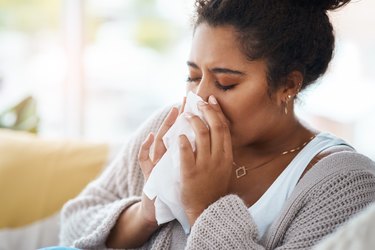
Ever notice a lingering odor after you sneeze? If you have a smelly sneeze, you might be wondering about the source of the stank and whether it's normal.
We spoke to Anthony G. Del Signore, MD, PharmD, director of rhinology and endoscopic skull base surgery at Mount Sinai Beth Israel, to learn what various types of sneeze scents could say about your health.
Video of the Day
Video of the Day
First of All, Why Do Sneezes Smell?
"A sneeze is a sudden expulsion of air likely due to an irritant or irritation in the nasal cavity," Dr. Del Signore says. Usually, these irritants are allergens (think: pollen or dust), environmental pollutants or germs like viruses. In other words, things your body wants to flush out.
These expelled particles are typically the source of your sneeze's scent, Dr. Del Signore says. So, if you get a whiff of pollen after you sneeze, that's probably because the annoying airborne allergen found its way up your nose.
Your sneeze's smell can also mimic the odor of your breath, Dr. Del Signore adds.
And while a random stinky sneeze isn't a cause for concern, some scents — like the four listed below — can indicate certain health issues if they occur frequently.
Tip
If you’ve been experiencing weird smelling sneezes regularly, see your doctor, who can perform a proper health assessment and help you determine what’s going on.
1. Your Sneeze Smells Sweet
If your sneeze is sweet-smelling like honey, the scent could signify elevated levels of ketones, Dr. Del Signore says. This can occur when you're on the keto diet, but it can also be a sign of something more serious, such as diabetic ketoacidosis, Dr. Del Signore explains.
Ketoacidosis is a dangerous diabetes-related complication that happens when your body can't produce enough insulin, which results in a buildup of ketones in your bloodstream, according to the Mayo Clinic.
Other symptoms of diabetic ketoacidosis include:
- Fruity-scented breath
- Shortness of breath
- Excessive thirst
- Frequent urination
- Nausea
- Vomiting
- Stomach pain
- Fatigue
2. It Smells Sour
Sour-smelling sneezes often go hand in hand with stinky saliva and bad breath.
A sour sneeze odor can definitely be a sign of tooth-related problems or gum disease, Dr. Del Signore says. "Plaque has a distinct sour smell to it, so exposed roots and poor dentition carry the same scents," he explains. And when you sneeze, you expel that smelly spit.
If your sneeze smells sour, schedule a checkup with your dentist ASAP.
Related Reading
3. Your Sneeze Smells Foul
If your sneeze has a putrid stench, it's probably due to a sinus infection, Dr. Del Signore says.
A sinus infection, also called sinusitis, occurs when fluid accumulates in your sinuses, which permits pesky pathogens to grow, according to the Centers for Disease Control and Prevention.
Symptoms of sinusitis include post-nasal drip and bad breath, which, as we know, can affect the way your sneeze smells.
And while sinusitis is a common culprit of foul-scented sneezes, any infection in the mouth or nose can cause a foul odor, Dr. Del Signore adds.
See your doctor if you suspect you have an infection, because you'll likely need antibiotics to clear it up.
4. It Smells Like Ammonia
Sneezes that give off an ammonia aroma or a hint of urine should give you pause.
This is likely linked to kidney problems, Dr. Del Signore says. When you have a kidney issue, "ammonia is not excreted efficiently, and thus there is a buildup of exhaled ammonia," he explains.
Consider an ammonia-smelling sneeze to be a red flag, and see your doctor as soon as possible.
Related Reading
Was this article helpful?
150 Characters Max
0/150
Thank you for sharing!
Thank you for your feedback!
Is this an emergency? If you are experiencing serious medical symptoms, please see the National Library of Medicine’s list of signs you need emergency medical attention or call 911.